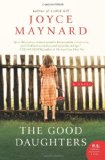Summary | Excerpt | Reading Guide | Reviews | Beyond the Book | Readalikes | Genres & Themes | Author Bio

A Novel
by Joyce Maynard
Ours was never a family with money, but we had mortgage-free land, which
we all understood to be the most precious thing a farmer could possess, the only
thing that mattered other than (and here came my mother’s voice) the church.
(And we had standing in the town that came from having history in a place
where not just our father’s parents and grandparents, but their great-grandparents
and great-great-grandparents before them, all lay buried in New Hampshire
soil.) More than any other family in town that was what made us who we
were—history and roots.
The Dickersons had drifted into town (my mother’s phrase once more) a
few years back from someplace else. Out of state was all we knew, and though
they owned a place—a run-down ranch house out by the highway—it was clear
they were not country people.
Besides Dana, they had an older boy, Ray—
lanky and blue-eyed—who played the harmonica on the school bus and once,
famously, arranged himself on the tar of the playground at recess, motionless
and staring blankly in the direction of the sky, as if he’d jumped out a window.
The teacher on duty had already called the principal to summon an ambulance
when he hopped up, dancing like Gumby, all rubber legged and grinning. He
was a joker and a troublemaker, though everybody loved him, particularly the
girls. His badness thrilled and amazed me.
Supposedly, Mr. Dickerson was a writer, and he was working on a novel,
but until that sold he had a job that took him on the road a lot—selling different
kinds of brushes out of a suitcase, my mother thought—and Valerie Dickerson
called herself some kind of artist—a notion that didn’t sit well with my mother,
who believed the only art a woman with children had any business pursuing was
the domestic variety.
Still, my mother insisted on paying visits to the Dickersons whenever we
were in town. She’d stop by with baked goods or, depending on the season,
corn, or a bowl of our fresh-picked strawberries, with biscuits hot out of the
oven for shortcake. (“Knowing Valerie Dickerson,” she said, “I wouldn’t put it
past that woman to use whipped cream in a can.” The idea that Val Dickerson
might serve her shortcake with no cream at all—real or fake—seemed more
than she could envision.)
Then the women might visit—my mother in her sensible farm dress, and the
same blue sweater that stayed on her for my entire childhood, and Val, who wore
jeans before any other woman I’d met, and served only instant coffee, if that. She
never seemed particularly happy to see us, but fixed my mother a cup anyway,
and a glass of milk for me or, because the Dickersons were health food nuts, some
kind of juice made out of different vegetables all whirled up together in a machine
Mr. Dickerson said was going to be the next big thing after the electric fry pan.
I hadn’t known the electric fry pan was such a big idea, either, but never mind.
Then they moved away, and you would have imagined that was the end
of our family’s association with the Dickersons. Only it wasn’t. Of all the
people who’d come in and out of our lives over the years—helpers on the farm,
customersat Plank’s, even my mother’s relatives in Wisconsin—it was only the
Dickersons with whom she made a point of not losing touch. It was as if the fact
that Dana and I were born on the same day conferred some sort of rare magic
on the relationship.
“I wonder if that Valerie Dickerson ever feeds Dana anything besides nuts
and berries,” my mother said one time. The family had moved to Pennsylvania
by now, but they’d been passing through—and because it was strawberry season,
and our birthdays, they’d stopped by the farm stand. Dana and I must have
been nine or ten, and Ray was probably thirteen, and tall as my father. I was
bringing in a load of peas I’d spent the morning picking when he spotted me.
It was always an odd thing—how, even when I was young, and the difference
between our ages seemed so vast, he always paid attention to me.
Excerpted from The Good Daughters by Joyce Maynard. Copyright © 2010 by Joyce Maynard. Excerpted by permission of William Morrow. All rights reserved. No part of this excerpt may be reproduced or reprinted without permission in writing from the publisher.
Your guide toexceptional books
BookBrowse seeks out and recommends the best in contemporary fiction and nonfiction—books that not only engage and entertain but also deepen our understanding of ourselves and the world around us.